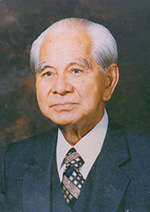|
 Seian
Hanashiro was born in 1903 in Haneji Village and graduated from
the Prefectural Agriculture and Forestry School in Kadena. He then
was employed as an elementary school teacher, but decided to move
to Brazil in 1926 after being invited by his friend, Mr. Taminato. Seian
Hanashiro was born in 1903 in Haneji Village and graduated from
the Prefectural Agriculture and Forestry School in Kadena. He then
was employed as an elementary school teacher, but decided to move
to Brazil in 1926 after being invited by his friend, Mr. Taminato.
He brought his wife two years later.
In the early days Hanashiro worked as an elementary school teacher and assisted with farming, eventually purchasing 120 hectares of land on which he grew bananas and achieved success.
He began purchasing more land and hired more laborers from the middle of 1934 to further expand his venture, and slowly but surely he attained greater business success with bananas and rice crops. Just before World War II he had roughly 600 employees from 150 families. He also kept himself busy managing general dealerships. According to research conducted in 1989, Hanashiro's assets included 2,250 hectares of real estate, five rice mills, an electric power plant, tractor, truck and other miscellaneous items all totaling approximately 40,000 contos (Brazilian currency at the time).
In 1936 he collaborated with a few friends to establish the Juquia Banana Producers Union; in 1946 Paulista Fruit Export, Ltd. was established in a partnership as well. Furthermore, in 1951 he established his own private firm and obtained distribution rights for Yanmar diesel engines.
Aside from his businesses, Hanashiro was also involved in various public organizations as well - he once even served as president of the Brazil Okinawa Association. His many years of charitable work and social contributions were officially recognized in 1975 when the government of Japan awarded him the Order of the Scared Treasure, Gold and Silver Rays. His name is marked in history as a gritty social leader who successfully transformed himself from an educator to an entrepreneur on emigrated foreign soil.
Hanashiro's character can be defined by an episode that occurred during the Pacific War. Following the Nissei deportation from Santos was the deportation order for Nissei at Juquia, Itariri. Although he was labeled a suspicious character, Hanashiro risked his own life and desperately pleaded to protect the 1,000 households at Itariri.
He was, without a shadow of doubt, one of the most influential social leaders of his time. His philosophy on emigration and how he actively commented on the should-be future of Okinawa are highly regarded to this day.
|